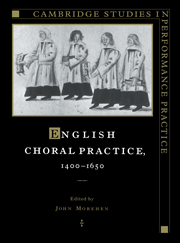Book contents
- Frontmatter
- Contents
- List of plates
- General preface
- Preface
- Abbreviations
- 1 To chorus from quartet: the performing resource for English church polyphony, c. 1390–1559
- 2 Editing and performing musica speculativa
- 3 The sound of Latin in England before and after the Reformation
- 4 English pronunciation, c. 1500 – c. 1625
- 5 Byrd, Tallis and Ferrabosco
- 6 John Baldwin and changing concepts of text underlay
- 7 Sacred songs in the chamber
- 8 The education of choristers in England during the sixteenth century
- 9 The ‘burden of proof’: the editor as detective
- Index of names and places
- Index of manuscript and printed music sources
- Index of works cited
3 - The sound of Latin in England before and after the Reformation
Published online by Cambridge University Press: 03 March 2010
- Frontmatter
- Contents
- List of plates
- General preface
- Preface
- Abbreviations
- 1 To chorus from quartet: the performing resource for English church polyphony, c. 1390–1559
- 2 Editing and performing musica speculativa
- 3 The sound of Latin in England before and after the Reformation
- 4 English pronunciation, c. 1500 – c. 1625
- 5 Byrd, Tallis and Ferrabosco
- 6 John Baldwin and changing concepts of text underlay
- 7 Sacred songs in the chamber
- 8 The education of choristers in England during the sixteenth century
- 9 The ‘burden of proof’: the editor as detective
- Index of names and places
- Index of manuscript and printed music sources
- Index of works cited
Summary
For many centuries Latin was the lingua franca of religion and scholarship in Europe, promoting the speedy dissemination of knowledge amongst those with the suitable education and background. As the language of worship in the Catholic Church, it inevitably also predominated in musical settings of scriptural and devotional texts for liturgical purposes, a fact which should not deceive us into the assumption that it enjoyed uniformity in its spoken and sung form. Erasmus, whose keen observations are one of our most useful sources of information about the pronunciation of Latin in Europe in the first half of the sixteenth century, noticed, for example, that:
Italians [outside Florence] make virtually no distinction between homine ‘a man’ and omine ‘a portent’. We in Holland make the distinction too obvious. Each of us is wrong, but each of us laughs at the other.
Thus, in order to establish the pronunciation of Latin texts for any period from the breakup of the Roman Empire to the twentieth century, the traditions of each country or region need to be considered separately, because the local linguistic environment is known to have had a major influence upon the way the words on the page were realized, so that Latin sounded different – often considerably so – in different countries.
We refer to these versions of Latin as vernacular Latins because the difference between them resided in the superimposition on to Latin of the sound-spelling rules of the local languages. The effect of this could be striking. Erasmus recounts how a Frenchman, making, in Latin, a speech of welcome to Emperor Maximilian I, was thought to be speaking French, ‘he spoke it with such a French accent’.
- Type
- Chapter
- Information
- English Choral Practice, 1400–1650 , pp. 74 - 89Publisher: Cambridge University PressPrint publication year: 1996



